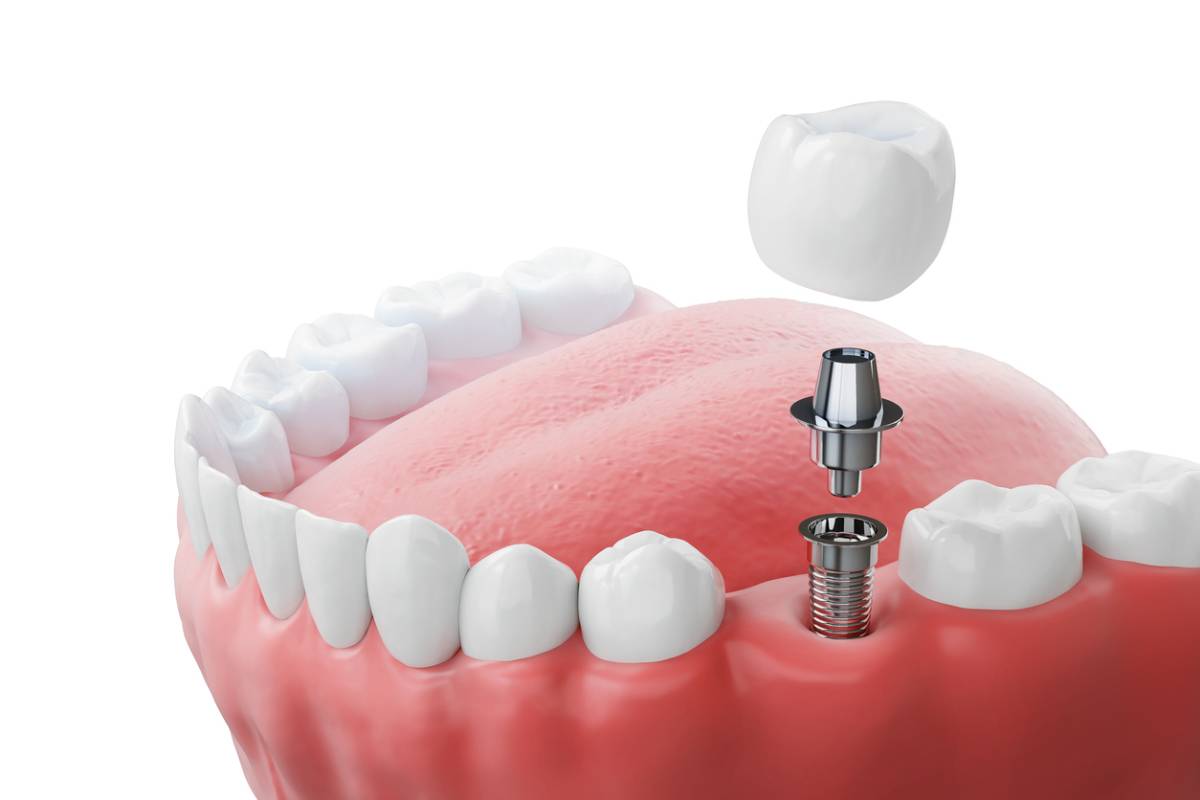Custom-made dental implants can dramatically change the quality of life of people who require a teeth restoration solution. Implants can improve chewing abilities and nutrition, thus supporting your general health and energy. They also can boost your confidence by giving you a beautiful smile. But do dental implants hurt? Please read our article to learn what you can expect during and after the implant surgery, as well as during the recovery period.
Do Dental Implants Hurt?
Getting dental implants is a surgical procedure that is done using either a local anesthetic or some type of sedation, including general anesthesia in some cases. Because of the anesthesia, the procedure itself does not hurt or cause any significant discomfort. However, you will most likely experience some pain and soreness once the anesthetic wears off. Dental implants can take several weeks to several months to heal completely, and you may experience some discomfort during this period, too.
First Days After Dental Implant Surgery
Let us look at the symptoms you can expect to have in the first couple of days after the procedure:
- Once the effect of the anesthetic wears off, you will most likely experience throbbing, soreness, or pain at the surgery site. These symptoms can be relieved with over-the-counter pain medication. However, if the medication does not work or the pain becomes more intense, we recommend consulting your doctor to make sure there is no infection or inflammation.
- You may also experience some bleeding in the first several hours after the procedure, but it should stop relatively quickly. If you experience bleeding for longer than 8 to 10 hours, contact your dentist.
- Swelling and bruising are also likely to occur but should subside gradually in several days. However, if bruising and swelling are severe and are accompanied by fever, make an appointment to see your doctor.
The subsequent Weeks After Dental Implant Surgery
The initial healing will be complete in 2 to 3 weeks after the surgery for most patients who do not have any unique medical conditions that prevent routine healing. At this time, you likely will not experience symptoms such as swelling, bruising, or pain, and you will be able to get back to your customary daily activities.
However, implants will still take some time to completely fuse with the jaw bone and become a secure and reliable support for dental crowns. This process might take anywhere from 3 to 6 months. During this period, you should still be mindful of the food you eat, the amount of strenuous activities you do, your intake of alcoholic beverages, and your smoking habits.
Your daily habits and activities will determine how fast your dental implants can heal. If you force yourself back into your routine before you are ready—by eating hard foods or engaging in overly strenuous activities, for example—you may increase your risk of implant failure.
Tips for Swift Recovery and Pain Management After Dental Implant Surgery
For the first couple of weeks after your dental implant surgery, we recommend following several helpful tips to alleviate the pain and other unpleasant symptoms you might experience.
- Take over-the-counter painkillers, such as Ibuprofen, to relieve the pain. Your doctor might recommend other types of pain medication, depending on your medical history. Remember to follow the instructions and never exceed the recommended daily dose of pain medication, as it can be damaging to your general health.
- Dentists often prescribe antibiotics to take after the surgery. To ensure no unwanted infection occurs and causes implant failure, take the entire course of the medication according to the schedule your doctor provides.
- If you experience swelling and bruising in the face and jaw, use cold compresses and keep your head alleviated when lying down.
- Make sure to maintain impeccable oral hygiene to prevent infections. That said, you must be careful when brushing your teeth so as not to disturb the implants. For this same reason, we do not recommend using a water flosser in the first weeks after the surgery. Ask your dentist how to brush your teeth with new implants and follow their instructions closely.
- Adhere to a liquid diet for a couple of days following your surgery, and then gradually switch to a soft diet, making sure that you still get enough nutrition required for healing and regeneration.
- Avoid any strenuous activities for at least 10 days.
- Take several days off work and rest immediately after the implant surgery.
- Abstain from smoking and drinking alcoholic beverages, as these substances can significantly slow down the healing and regeneration of your gums and the jaw bone.
Make an Appointment Today
Sign up for a dental implant consultation with an experienced dentist today. Do not hesitate to call TruGlo Modern Dental today. We look forward to your visit.
